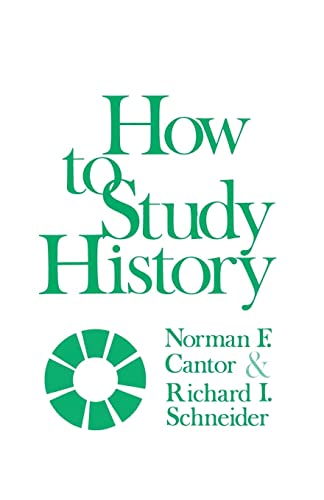

How to Study History
S**T
The book I wished I had read BEFORE getting a degree in History
I really wish I had read this book or had it covered at the start of my courses in History. If you're heading off to college or considering a degree in History I highly recommend this book.Along the way you'll learn how to take notes such that you're not trying to transcribe the lecture, How to study the books you need to cover and have time for all your classes, How to conduct research and what the goal of your research really is, ...Since he discusses reading primary and secondary works quickly, understanding and criticizing the writer, and asking questions of the work to see if his ideas stand up, this book is excellent for any course of study not just History although some discussions in the book are specific to students of History.One note, another reviewer mentioned that some of the research techniques are outdated. Fair enough, it was written in 1964 before Google and before you could call up the Library of Congress website and search their card catalog online. However, the techniques he mentions for using the card catalog, discovering the works in your subject and sub-subject areas are easily adaptable to a tech savvy student in this technical age.
R**N
Lots of highlighting
The book is in excellent shape, but does have a lot of highlighting, despite the description. I chose this particular used book because it noted that there was no highlighting and they prided themselves on accurate descriptions. Definitely readable and usable, but I really hate other people's highlighting.
R**R
OK
Pretty good
Z**D
Four Stars
Howard Zinn needs a copy of this book. And every kid who is forced to read his book.
E**N
Valuable but Dated
This classic is getting dated, but still contains valuable insight and approaches to the study of history. The principles remain the same in the study of history, but the methods and introduction of the Internet changes the game. Still worth reading, but not the same value as 25 years ago.
K**N
I wanted to read this book so that I could gain a better understanding and appreciation of good historical writing.
I wanted to read this book so that I could gain a better understanding and appreciation of good historical writing, and how to get the most out of the history books I plan on reading. How to Study History is an excellent and inspiring book for those who are interested in either reading about history for general interest, or studying history as a career endeavour.The author makes it clear early on that studying and understanding history requires work (depending on your level of interest, of course). However, the way this book is written makes the work seem fun and exciting. The examples used to illustrate the points made are clear and instructive.This book inspires the reader to get more involved with their field of study (particularly history, in this case), and provides the blueprint for effective study. It covers many topics that the reader can use to make their study of history more complete and enjoyable.Some of the topics covered are:-how to be a more thoughtful reader by being aware of the author's style and how they present information-how to get the most out of reading textbooks and attending lectures-how to hone your reading and research skills-in-depth advice on how to approach studying-different ways of examining data and the common ways information can be interpreted-the role of a historian and the types of questions a historian should ask-the skills and character traits necessary to become a historian, and how one can go about becoming a historianContents:1. A Commitment to Excellence2. A Matter of Definition3. The Materials of History4. How to Use Primary Sources5. How to Read Secondary Sources6. A Practical Lesson in How to Read A History Book7. Excursus on Auxiliary Disciplines8. Forms of Historical Communication9. Shaping an Historical Essay10. Research Techniques11. Historical Prose12. Two Student Papers Critically Examined13. Historiography and the Philosophy of HistoryIndex
C**E
a valuable resource
Although dated, this book offers many good insights into the study of history & is well worth reading.
K**M
Required Reading For College Students
This book should be required reading for every first year college student because it teaches you HOW to read and study history... literally. It serves as a step-by-step instruction manual that makes the clear point that reading historical non-fiction is NOT the same as reading any other genre, and should not be read, studied, or remembered in the same way. In fact, the book is so practically useful that the best descriptions of it are to be found in the chapter and section titles in its table of contents: "Why Study History?", "How to Use Primary Sources", "How to Read Secondary Sources", "How to Use a Textbook and Take Lecure Notes", "Planning an Undergraduate History Program", "Shaping an Historical Essay", "Book Reviews", "How to Use the Library"... You get the point. If you have read Michael Stanford's "A Companion to the Study of History" then consider this book as its perfect compliment. Where Stanford's book mentally equips you to approach the study of history, this book physically prepares you for historical work. I wish I had discovered this book before my third year as a history major. If I could make some critical comments about this book, which are usually more helpful than unadulterated praise, then I would. After discovering many of the techniques Cantor discusses on my own through trial and error, I can recommend this book with 100% confidence. If you must take college history courses - let alone major in history - purchase this book.
M**T
Five Stars
Great book! Can't wait to read it! Shipping was all right.
Trustpilot
3 weeks ago
2 weeks ago